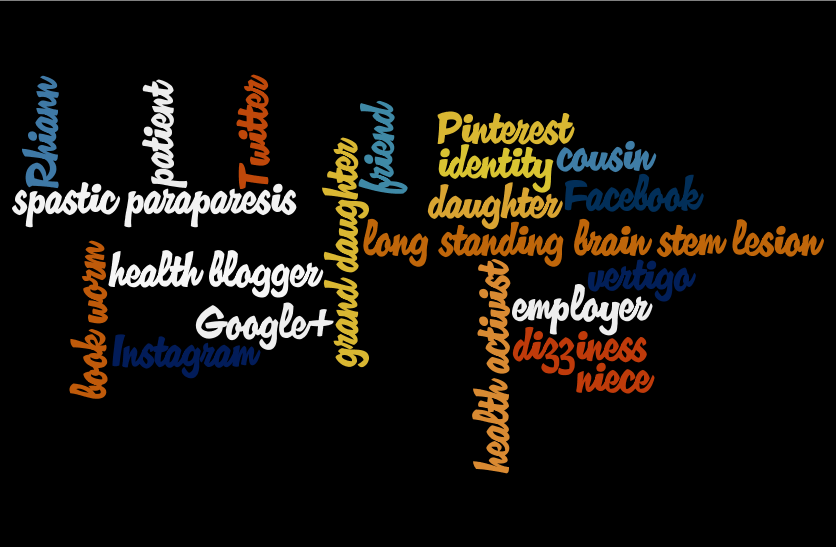I was reading an interesting book regarding chronic illness, and through this some questions about chronic illness and identity occurred to me.
Obviously, living with a chronic illness does not define any of us – the illness is merely one piece of the puzzle that makes up our lives. As well as being a patient with chronic illness, I have many other identities that make up my life – daughter, granddaughter, niece, cousin, friend, avid reader, blogger and so on.
However, can living with a chronic illness (and especially when living with a condition from childhood) influence a person’s identity?

For example, if I didn’t live with the spastic paraparesis which causes the stiffness, weakness and pains in my legs, would I still have an avid interest and love for reading and books, as well as a keen television and film watcher. According to my parents, I was a book lover since I was a very young child, and perhaps the pain in my legs was a reason why I became such a lover of reading instead of taking an interest in sports.
For people, however, who develop a chronic illness later in life, it can threaten one’s identity, disrupting every aspect of their life, including hobbies and interests. Sufferers of chronic illness may have to stop their beloved interests, for example, playing a favourite sport because of pain or fatigue. As a result, it is said that the person may have to ‘reconstruct’ their self-image; for example, finding a new interest which the person can still gain great pleasure from, but not as a consequence to their health.
Lately, I have been struggling with the condition in which I live; I have been feeling even more tired than usual, the dizziness and vertigo have become even more intense and even the weakness, stiffness and pain in my legs have also worsened. Because of this, my emotions have also been up and down – crying and feeling sad being a constant feature in my present.
Thankfully, I have found another interest, thanks to the new social group that I have been attending, I now added to my arts and crafts love – creating and making cards. I have now made a couple – generally takes me longer to complete because my problems with manual dexterity. However, I have grown to love making cards – its relaxing and allows a distraction from the pain and dizziness that I live with constantly. I have even added a photograph of a card that I have made for my Mum for ‘Mother’s Day’ on March 10th!

So, for everyone reading this also battling chronic illness – do you think that the illness has moulded your identity – influencing your choice of hobbies and activities that you enjoy? Has chronic illness made you change particular hobbies and activities because you are no longer able to participate in them? Would love to hear your thoughts….
6 Comments
Interesting question! I don’t think my chronic illness has shaped my identity. It had not much chance to do so, as it developed relatively late in my life, at 40+. Also as a Christian I believe that my identity is always in relation to God Who defines who I am and what I am here for. He is master of everything I am and have, and everything which is in my life (whether I like it or not) is there for a purpose. No-one, not even a very ill person who cannot move or talk, is on this Earth without being of some use (unless they choose to be of no use). Sometimes, especially at the beginning of my illness when I slowly realized that I would probably never get rid of it and how much it would prevent me from doing “great” things, I fell into the trap of being depressed because of it. Meanwhile, however, I have realized that I’m exactly in the position where God wants me to be (for now) and He always gives me the ability to do the tasks I have to do. If He wants me to do something I need more health and strength for, He will give it to me. Therefore my illness (or anything else which happens in my life) can never shape my identity 🙂
Great blog post! I don’t think my identity was shaped by illness; however, I did experience grief over losing good health. Also, it was quite confusing, because it did not happen all at once; and it took a long time for me to get the correct diagnosis. I am like Barbara: my identity is in Christ. And I am like you too: I always liked to read and do things with my hands. However, there was one area I have struggled with more than any other: I hardly ever go to church or other places anymore. When I have flare-ups, I am too greatly fatigued and often in pain. And I have a hard time keeping house.
Rhiann, The interplay between chronic illness and self-identity is a general theme that often surfaces in my own blog. My chronic condition started at age 8-1/2 and though it hardly defines me, it has shaped me in so many ways: my need to control the world around me in compensation for a body I can’t control, a lack of self-confidence going back to how other kids reacted to me during childhood, maybe not my initial career choice but certainly those I pursued later in life, the leisure activities available to me. Social isolation as a child encouraged an interest in reading but perhaps I was destined for a love affair with books, I’ll never know. I’m hardly Miss Sporty but maybe I was never meant to be athletic. Also, although Dystonia has posed limitations in my life, it has also enabled me to see new possibilities and opportunities and I’ve discovered a whole world I may never have known. So I think I have my own unique identity, parts of which have been influenced by my chronic condition. Somewhere along the way, the lines blurred and it all simply became “me.” -Pamela-
Pingback: MS Whammy: The Raw Emotional Impact | MS Means…Living and Laughing with Multiple Sclerosis
Pingback: Pity Parties | Living Life As I See Fit
Very much so. My original dream was to open my own bakery, and that’s been replaced by a career in writing. I used to love dancing argentine tango and I learned how to DJ for it, but after my disability worsened, I couldn’t dance anymore, so instead I took over organizing the dance and got way more focused on DJing. Anything I could do on a computer became my focus instead of a side hobby.